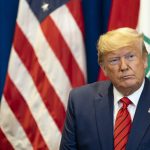As the political winds begin to shift yet again, all eyes are on the Silver State, Nevada. Former President Donald Trump recently held a spirited rally in Las Vegas, and it was clear: he believes November 5th could be a pivotal day in U.S. history. With cheers and applause resonating through the audience, Trump made a bold claim that winning Nevada might just unlock the doors to the White House again. After experiencing loss in Nevada during the last two election cycles, the stakes are higher than ever, and recent polling suggests it could be anyone’s game this time around.
What’s fascinating about this political drama is the changing demographics among voters in Nevada. A local political consultant, representing a Latino coalition supporting Trump, pointed out that the tide might be turning. While the latest numbers show Vice President Kamala Harris leading Trump by a margin of 51% to 41%, many in the Latino community are re-evaluating their political loyalties. Historical perspective shows that Republican candidates rarely managed to cross the 30% threshold among Hispanic voters, making this a significant moment for the GOP as they aim to win over this crucial demographic.
https://www.youtube.com/channel/UCXIJgqnII2ZOINSWNOGFThA
One of the key factors driving this change seems to be immigration policies. Contrary to Democratic expectations that opening the borders would garner Latino support, the reality reflects a different sentiment. Many Hispanic voters are concerned about the increasing numbers of undocumented immigrants entering the country. This influx is not just a political talking point; it directly impacts job availability and access to social services, leaving many Hispanic Americans feeling sidelined. The working-class Latinos, who form an integral part of the American economy, are understandably frustrated when they see their contributions taxed to provide services for others who jumped the immigration line.
Inflation, a topic on everyone’s mind, keeps surfacing as a major concern for Hispanic families. The working class, including many Latinos, struggle with skyrocketing prices for everyday essentials. This issue isn’t just a passing inconvenience; it shapes the very foundations of family life. When asked pointedly about inflation at a recent debate, Kamala Harris’s refusal to directly address the question didn’t sit well with many voters. As families grapple with high costs of living, her evasive responses were perceived as a disconnect from the realities that Latinos face daily. If there’s one thing the community doesn’t appreciate, it’s being stonewalled on critical issues that affect their livelihoods.
The former President’s return to the political stage is more than just a campaign; it symbolizes a fight to regain control over issues that affect everyday Americans. Trump’s supporters believe that he can restore the economy to the stability it enjoyed during his administration—one characterized by job creation and lower costs. As the theme of his rally resonated deeply with his audience, it’s clear that the desire for robust immigration reform and better economic management is at the forefront of Latino voters’ minds. The message seems aimed at uniting the demographics that have historically been overlooked by the Democratic Party in Nevada.
In conclusion, the stage is set, and the stakes couldn’t be higher as the people of Nevada prepare to make their voices heard. As the November elections approach, Republican strategists eagerly watch to see if Trump can turn the tide in a state that has eluded him in the past. With the potential to sway Latino voters and a promise of addressing their concerns, Nevada might just become the keystone in Trump’s bid for the presidency. As these candidates rally their bases and prepare for battle, one thing is certain: Nevada will undoubtedly play a crucial role in shaping the future of American politics. Who will come out on top is anyone’s guess, but the excitement is palpable, and America will be watching closely.




